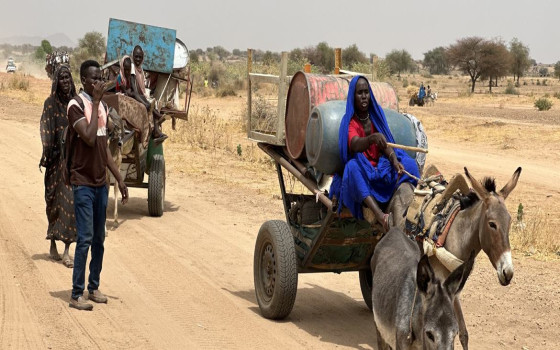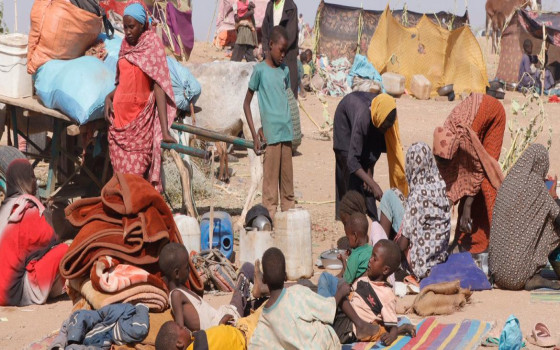Sudan faces worst cholera outbreak in years amid war and displacement, Security Council calls for ceasefire in El Fasher and rejects establishment of parallel authority

- Europe and Arabs
- Thursday , 14 August 2025 8:58 AM GMT
Khartoum - New York: Europe and the Arabs
In early August, cholera treatment wards in the town of Tawila in North Darfur State were filled with patients lying on modest beds, with intravenous drips visible, reflecting the severity of the epidemic. Doctors Without Borders confirmed in a statement on Thursday that Sudan was experiencing "the worst cholera outbreak in years."
The international medical organization indicated that the spread of the disease was no longer confined to Sudan's borders, warning that it could exacerbate similar outbreaks in neighboring countries in the coming weeks and months.
Crossing Borders and UN Warnings
"The epidemic has already crossed borders into South Sudan and is now crossing into Chad," said Sheldon Yate, UNICEF Representative in Sudan. He added: "Unless we can contain this crisis, it will continue to spread across borders for weeks and perhaps months." According to the Brussels-based Euronews website, and according to data from Doctors Without Borders, since the Ministry of Health announced the outbreak a year ago, Sudan has recorded nearly 100,000 suspected cholera cases and more than 2,400 associated deaths, including 40 deaths in just one week in the western Darfur region.
This came after Security Council members expressed their grave concern over reports of a renewed attack by the Rapid Support Forces in El Fasher and urged them to allow unhindered humanitarian access to the city.
This came in a press statement issued by the Security Council members, recalling Resolution 2736 (2024), which demands that the Rapid Support Forces lift the siege of El Fasher—the capital of North Darfur—and calls for an immediate cessation of fighting and de-escalation in and around the city, where famine and severe food insecurity are feared.
The Security Council members also condemned the attacks launched by the parties in the Kordofan region in recent weeks, which have resulted in large numbers of civilian deaths. They also expressed their deep concern about the impact of the conflict, including attacks on humanitarian operations.
They called on the parties in Sudan to allow safe and unhindered humanitarian access, in accordance with relevant provisions of international law. According to the UN Daily News Bulletin,
Rejection of the establishment of a parallel governing authority
The members of the Security Council rejected the announcement of the establishment of a parallel governing authority in areas under the control of the Rapid Support Forces. They expressed their grave concern about the repercussions of these actions, which pose a direct threat to the territorial integrity and unity of Sudan and threaten to exacerbate the ongoing conflict, fragment the country, and worsen the already dire humanitarian situation.
The members of the Security Council unequivocally reaffirmed their unwavering commitment to the sovereignty, independence, unity, and territorial integrity of Sudan. They emphasized that any unilateral steps that undermine these principles threaten not only the future of Sudan but also peace and stability in the region as a whole. They reaffirmed that the priority is for the parties to resume talks to reach a permanent ceasefire and create the necessary conditions for a political solution to the conflict, with the participation of all Sudanese political and social actors, to re-establish a credible and inclusive political transition towards a democratically elected national government, following a civilian-led transitional period, to fulfill the aspirations of the Sudanese people for a peaceful, stable, and prosperous future, in full accordance with the principles of national ownership.
The members of the Security Council urged all Member States to refrain from external interference that seeks to fuel conflict and instability, and to support efforts to achieve lasting peace.
They affirmed their full support for the Personal Envoy of the Secretary-General, Mr. Ramtane Lamamra, and his efforts to use his good offices with the parties and civil society, leading to a sustainable solution to the conflict through dialogue.
The Threat of Famine and a Worsening Situation
UN Spokesperson Stéphane Dujarric said that 17 areas in Sudan are now classified as "at risk of famine," including parts of Darfur, the Nuba Mountains, Khartoum, and Al Jazirah. In his daily press conference, Dujarric stated that since a year ago, when famine was confirmed in the Zamzam camp for internally displaced persons and has since spread to areas in Darfur and Kordofan, "the situation has worsened, particularly in El Fasher," the capital of North Darfur state.
He quoted the World Food Programme as calling for humanitarian access to El Fasher, which is facing hunger and remains cut off from humanitarian aid.
The WFP stated that, as a coping mechanism, some residents in the area are surviving on animal feed and food waste.
He confirmed that it continues to provide digital cash support to approximately a quarter of a million people in the city, allowing them to purchase the remaining dwindling food in the markets.
However, he cautioned that the growing needs make it imperative to address the hunger situation on the scale required.
The UN spokesperson said: "We reiterate our concern about the ongoing conflict and renew our calls on all parties to end the violence, resolve to engage in dialogue, and put the interests of their people first." UN Outrage Over Dozens Killed in El Fasher
The UN High Commissioner for Human Rights, Volker Türk, expressed his outrage over the large-scale attack launched by the Rapid Support Forces on the besieged city of El Fasher and the adjacent Abu Shouk camp for displaced persons, which resulted in the deaths of dozens of civilians.
A statement issued by his office on Wednesday stated that, according to preliminary information obtained by the office, at least 57 civilians were killed in the attack on El Fasher, including 40 displaced persons in the Abu Shouk camp in North Darfur. The statement added that the office is following up on allegations of executions of displaced persons in the camp during the attack.
"With deep sorrow, we are once again witnessing unimaginable horrors being inflicted on civilians in El Fasher, who have suffered for more than a year under an ongoing siege, relentless attacks, and dire humanitarian conditions," Türk said.
He added, "These repeated attacks on civilians, and the serious concerns they raise under international humanitarian law regarding direct and indiscriminate attacks, are completely unacceptable and must stop immediately."
Türk reiterated his alarm about the serious possibility of ethnically motivated violations and attacks as the Rapid Support Forces attempt to seize control of El Fasher and Abu Shouk camp.
He emphasized the potential for a recurrence of the horrific patterns of violations of international humanitarian law and human rights violations and associated abuses, as documented in the context of the Rapid Support Forces' attack on Zamzam camp in April.














No Comments Found